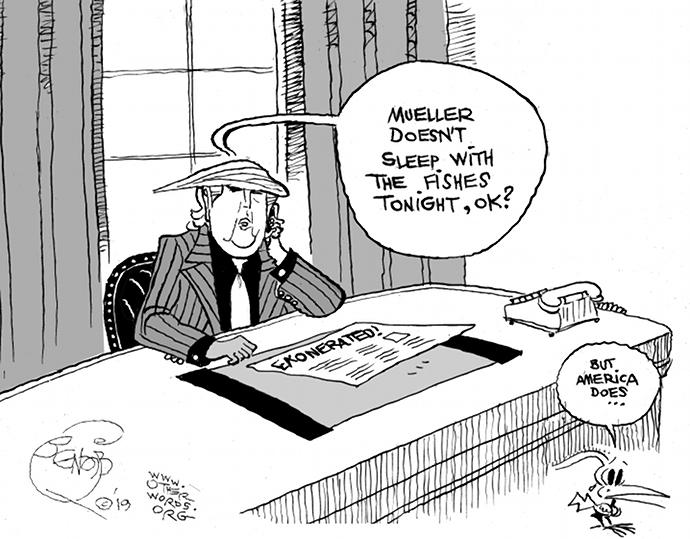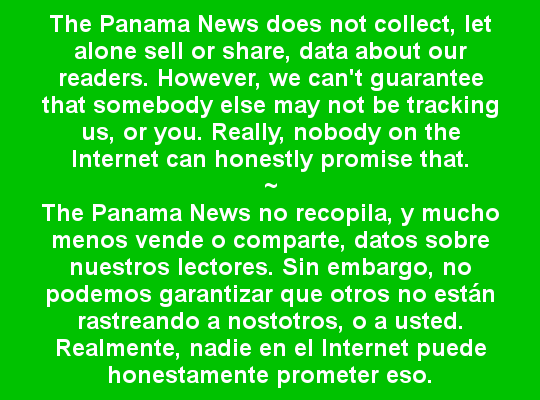Cartoon by Khalil Bendib — OtherWords
As they do their clumsy victory dance…
by Eric Jackson
Consider, for just a bit:
- You have not seen the Mueller report, nor have I, nor have the media that pretend that they have seen it. Congress has seen a summary by a partisan member of the Trump cabinet, and this has largely leaked out. Big difference.
- A decision not to indict is not a declaration of innocence. It might be. On the other hand, a prosecutor may believe that the target of an investigation is as guilty as sin, but she or he will probably not be able to convince a jury of that guilt beyond a reasonable doubt.
- The press and general public, absent an egregious leak, is unlikely to get all of the facts and documents that went into Mr. Mueller’s investigation. Those sorts of situations give rise to all manner of conspiracy theories, but consider one likely road map to the investigation that would probably never be revealed in court, to Congress or in any press release, the National Security Agency (NSA) phone logs, records of emails and electronic money transfers, and recorded conversations. There have been leaks over the years about the capabilities and practices of this shadowy agency and its British, Canadian, Australian and New Zealander partners — Edward Snowden’s revelations were hardly the first. One would expect that several other countries have more or less similar capabilities and some would share information with the United States. This stuff would be kept as secret as possible, but with the allegation of a Russian attack on the US political system as the subject under investigation, it is hard to imagine that one of the first things that former FBI director — and thus US counter-intelligence chief — Robert Mueller didn’t ask the NSA what they had. It’s also hard to imagine that if the NSA told him at the start that there was nothing there Mueller would not have taken that advice seriously. More likely, Mueller got some tantalizing leads from the NSA and worked back, knowing that his leads could not be used or even admitted in court.
- The celebrated Steele memo? Mostly confirmed. Did the guy have some issues with romanizing names in the Cyrillic alphabet, get a few tangential facts garbled, make some inferences that didn’t pan out? Of course he did. But mostly he got the story right. But that memo would be for a variety of reasons starting with hearsay rules, not admissible in court.
- That the Kremlin interfered in the elections of the United States and several other countries is well established. The indictments of all those Russian individuals and institutions by the Special Counsel’s office are not hoaxes, not frame-ups. The people screaming the loudest that they are fraudulent are by and large people who were spreading all those Russian memes all over the social media in 2016.
- The sources of information about Russia’s covert propaganda campaigns are not just “Deep State” spooks. They are also Google, Twitter and Facebook. Much to the embarrassment of those companies.
- In a well documented public declaration Donald Trump called on Russia to release Hillary Clinton’s emails. Shortly thereafter her campaign chief’s emails were released. Then, with the fall campaign underway, Mueller alleges that Trump’s campaign manager, Mr. Manafort, gave a 75-page file of Trump campaign polling data to a man believed to be a Russian intelligence agent. Drawing lines of causality among such event to that satisfaction of a jury would not be a slam-dunk, no matter the first-glance inferences.
- It is protested that the men around Trump who were convicted were not charged with being Russian spies or Kremlin assets, but rather for economic crimes or for lies told. But what were their lies about? They were about their contacts with Russian operatives.
- Barr acknowledges that Mueller reported that he would not be ready to exonerate Donald Trump for obstruction of justice? Obstruction of what? Mueller’s inquiries about Russian interference in the 2016 election process.
- And what about “The Deep State?” Yes, there are millions of Americans in government jobs who would not be were it thought that they did not share in a certain belief system about patriotism, propriety and prudence. One who is known to be indifferent to a foreign power gaining control over the US political system will generally not get a security clearance from the United States government, for example. In the coming months one or more “Deep State” functionaries with access to the Mueller Report may well leak it, notwithstanding superior orders, precisely because of the conformist belief system to which she or he or they adhere.
- Mueller did not go on a fishing expedition, and thus there is an entire life of crime in which Donald Trump and his family have been immersed for decades that the Special Counsel did not touch. But what about Manafort’s financial crimes? one might ask. Well, yeah. You have a president’s campaign manager with questionable ties to foreign powers that run to the heart of the investigation, and that person and his possible motives will be minutely examined. Turns out that he’s a thuggish and greedy man, which in the end might be Trump’s best defense, that he was played by Manafort, who behind Trump’s back was in it for himself.
- There are other investigations underway, which the Barr summary of the Mueller Report will be used to denigrate. The question is how many American voters will fall for that. Trump may have some control over the federal prosecutors in the Southern District of New York, and the others who are following the leads spinning off of Maria Butina, the Russian operative in the National Rifle Association. Trump won’t have such control over New York’s Attorney General or committees of the US House of Representatives.
- What American weaknesses did the Russian cyber-propagandists exploit? Some obvious ones like racial conflicts, economic inequalities and religious bigotry, to be sure. Perhaps the most glaring of all, and what is most painful to admit, is the dumbing down of America. It’s partly based on a degraded public education system that those of us Americans living abroad would recognize in the inability of so many Americans to find the countries in which we live on a map. But it’s also to be seen in formerly reputable corporate mainstream news organizations pumping speculation as fact, and taking sources known to lie without skepticism. The “Gulf of Tonkin incident,” Saddam Hussein’s purported weapons of mass destruction, the Birther conspiracy theory, the 9/11 Truther conspiracy theory, all those urban legends that gave rise to the like of Snopes and then the rise of conspiracy theories to discredit the fact checkers — those told the Russians that they had a gullible nation as a target.
- Part of America’s gullibility is about the Russians. Quite frankly, a lot of media whose editorial lines are anti-Trump and a lot of Democrats have made asses of themselves about this. Sponsor an anti-Russian coup in Kiev? Threaten to put NATO missiles in Estonia, less than an hour’s car drive from Russia’s second-largest city, St. Petersburg? Hatch a Syrian regime change plan that would deprive the Russian Navy of its use of the Mediterranean port of Tartus? We were supposed to expect that there wouldn’t be a strong response from the Russians, no matter who was in charge? And a Cold War II with Russia with China standing by laughing? What kind of geopolitical idiocy is THAT?
These links are interactive — click on the boxes













